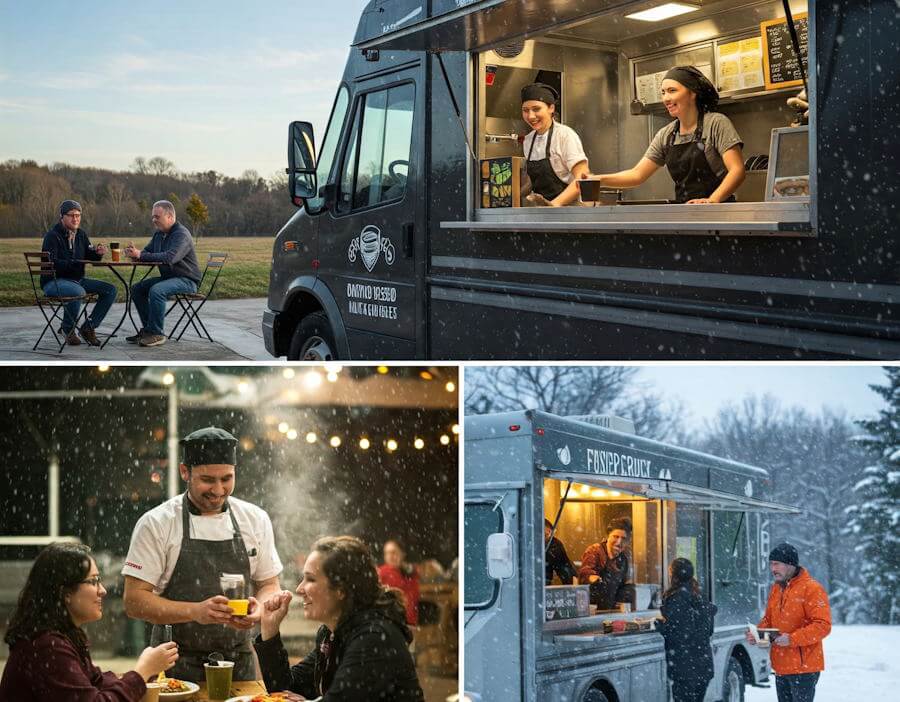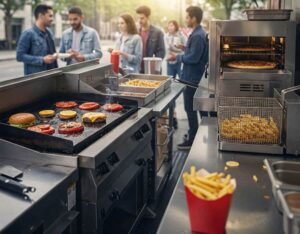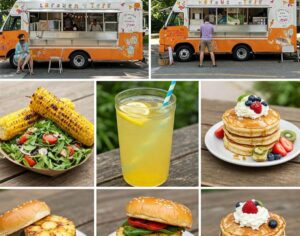Food trucks have emerged as a popular and dynamic segment within the food industry, providing an innovative way for entrepreneurs to deliver culinary delights directly to consumers. These mobile eateries offer a versatile array of options, ranging from gourmet burgers and artisanal tacos to vegan specialties and sweet treats, catering to diverse tastes and dietary preferences. The appeal of food trucks lies not only in their diverse offerings but also in their ability to operate in various locations and settings, establishing a direct connection with the community.
The growth of food trucks can be attributed to several factors, including the increasing demand for fast and convenient dining options, the desire for unique culinary experiences, and the relatively low startup costs compared to traditional brick-and-mortar restaurants. As a result, many food enthusiasts have seized the opportunity to express their culinary creativity while enjoying the benefits of flexible operating hours and locations.
However, operating a food truck comes with its set of challenges, particularly concerning weather conditions. Unlike stationary restaurants, food trucks are exposed to the elements, from scorching heat to heavy rain or snow. Each weather pattern presents its own difficulties, influencing factors such as customer turnout, food preparation, and overall customer experience. Thus, adaptability and meticulous planning become essential elements for food truck owners aiming to succeed in such a dynamic environment. Efficient management of operational aspects, including purchasing appropriate equipment and devising backup plans, can mitigate the effects of adverse weather conditions and ensure that the business remains resilient.
As the food truck phenomenon continues to grow, understanding the intricacies of this business model is crucial. By recognizing the unique challenges posed by weather, prospective food truck operators can better prepare to navigate their way through various operational hurdles, ultimately leading to a rewarding and successful venture.
The Impact of Weather on Food Truck Business
Operating a food truck comes with its unique set of challenges, and weather conditions are among the most significant factors influencing daily operations. Rain, snow, extreme heat, and strong winds can each pose distinct challenges that directly affect customer turnout, food safety, equipment functionality, and ultimately overall sales. Weather conditions not only determine foot traffic but also influence the purchasing behavior of customers.
During rainy days, food truck operators often experience a notable decline in customer turnout. Many patrons prefer to seek indoor dining alternatives when it’s wet outside, fearing discomfort while waiting in lines or consuming food. This can lead to lower sales figures for food trucks that rely heavily on outdoor customer interactions. Anecdotal evidence suggests that food trucks with unique offerings, such as warm comfort food, may fare slightly better during such inclement weather, yet overall attendance tends to drop.
Snow and ice present even more significant challenges to food truck operations. Snow accumulation can hinder mobility to and from locations, while icy conditions can deter customers, impacting sales considerably. This weather forces food trucks to re-evaluate their locations, as foot traffic declines dramatically in colder climates, especially in regions that are used to snow. In contrast, operators who are adaptable often find opportunities in clearing pathways and promoting comfort food, helping mitigate losses.
Extreme heat affects both the food truck’s equipment functionality and food safety. High temperatures can lead to food spoilage if not carefully monitored. Furthermore, customers may be reluctant to stand in long lines or wait for food in scorching conditions. The success of food trucks during hot days can hinge on effective menu planning and the provision of refreshing items that attract customers seeking relief.
Finally, strong winds can not only disrupt outdoor dining experiences but may also pose risks to equipment stability. Food vendors must ensure their setups remain secure and safe for customers, while also factoring in potential impacts on signage and marketing displays. Overall, understanding the multifaceted effects of varying weather conditions can empower food truck operators to adapt their strategies and safeguard their business interests in a dynamic environment.
Prepping Your Food Truck for All Weather Scenarios
Operating a food truck successfully requires careful preparation, especially when considering the diverse weather conditions that can impact service. Whether facing the sweltering heat of summer or the biting cold of winter, operators must take specific steps to ensure their food truck remains functional and compliant with health and safety standards. Below is a checklist of essential preparations for all-weather scenarios.
Firstly, equipment modifications are crucial. In colder months, installing a well-insulated heater helps maintain a comfortable working environment inside the food truck. This not only supports the staff’s efficiency but also ensures that food items stay within safe temperature ranges during preparation. Conversely, for hot weather, having an effective cooling system, such as air conditioning or fans, can prevent overheating and keep perishables safe. Furthermore, outfitting your food truck with a sturdy awning provides shade and protection from rain, creating a more comfortable space for patrons and preserving food during inclement weather.
Attention to food storage solutions is equally essential. Invest in high-quality, weather-resistant storage containers that protect supplies from humidity and temperature changes. Ensure that all refrigeration units function optimally to store perishable goods, adhering strictly to food safety protocols regardless of external weather conditions. This includes checking that food is at appropriate temperatures before serving to prevent contamination.
Additionally, it is prudent to stock safety gear like non-slip mats, appropriate footwear, and rain gear for staff, which ensures health and safety while on the job. By preparing your food truck for adverse weather—through equipment upgrades, effective food storage, and safety measures—you not only enhance operational efficiency but also maintain high food safety standards that prioritize the well-being of both the customers and the staff.
Marketing Strategies for Different Weather Conditions
Effective marketing strategies play a crucial role in the success of food trucks, particularly when navigating the challenges posed by varying weather conditions. Understanding how to adapt marketing efforts to the climate can help food truck operators attract customers regardless of inclement weather or sunny days. During colder months, it becomes essential to offer comfort food options that resonate with customers seeking warmth and refuge from the elements. Menus featuring hearty soups, grilled cheese sandwiches, and warming beverages can appeal to patrons looking for a cozy dining experience.
Social media platforms present an invaluable opportunity for food truck operators to engage with their audience. By posting timely updates about special deals or unique comfort food offerings during inclement weather, operators can entice customers to brave the elements for a rewarding meal. For example, promoting a “soup of the day” on a foggy afternoon can draw attention, while posts featuring steaming bowls can create a sense of urgency and anticipation. Visual content, such as photos or videos of food being prepared, can further resonate with prospective diners, encouraging them to visit even in less favorable conditions.
Conversely, during hot weather, a different strategy is required. Light and refreshing menus that include items such as salads, fruit bowls, and cooling beverages can attract customers looking to beat the heat. Promoting specials like “cool off with our fresh lemonade” or “try our new berry smoothie” can effectively showcase seasonal offerings. Utilizing hashtags related to summer or outdoor activities in social media posts can also increase visibility and reach, drawing customers in during peak sunny hours.
The success stories of food trucks that have pivoted effectively in response to weather changes underline the importance of these marketing strategies. By staying attuned to customer preferences and environmental factors, food truck operators can maintain brilliance in their operations, regardless of the weather.
Essential Equipment for Weather Resilience
Operating a food truck requires not only culinary skills but also the right equipment to ensure that your business can thrive regardless of weather conditions. One of the most important investments for any food truck owner is a reliable mobile canopy or tent. This equipment provides essential shelter from both rain and harsh sunlight, ensuring that your cooking area remains dry and protected while offering customers a comfortable place to order from. Popular brands like EZ UP and Canopy have models specifically designed for food trucks, offering durability and ease of setup.
An effective refrigeration system is another key component for food trucks, particularly when dealing with extreme temperatures. Mobile refrigerators must maintain a consistent temperature to ensure food safety and quality. Brands such as True or Turbo Air offer reliable, compact refrigeration units suitable for food trucks. Selecting a unit with energy-efficient features is also vital, as it can help mitigate the impact of high ambient temperatures on your food storage needs.
In addition to these essentials, having a portable generator ensures that you remain operational during power outages or when access to electricity is limited. Generators by Honda or Yamaha are known for their reliability and fuel efficiency, making them ideal choices for food truck operators. They can keep your appliances running smoothly, whether you’re dealing with a busy event or adverse weather conditions.
Finally, adapting cooking equipment to withstand different climates is crucial. Grills that can function optimally in colder conditions, such as infrared grills, can help maintain performance even when temperatures drop. For warmer environments, consider equipment like induction cooktops, which generates less ambient heat, making the cooking environment more comfortable. By investing in suitable weather-resistant equipment, food truck operators can ensure continuity of service and a pleasant experience for both staff and customers regardless of the weather.
Customer Engagement Techniques in Adverse Weather
Operating a food truck during adverse weather conditions presents unique challenges, yet it also creates opportunities for engaging with customers in innovative ways. One effective tactic is to utilize interactive social media campaigns that encourage customer participation. For instance, during rainy or snowy seasons, food truck operators can create a themed photo contest, inviting patrons to share images of their meals enjoyed amidst the weather. This not only fosters a sense of community but also increases online visibility and engagement.
Another strategy involves implementing promotions tailored to inclement weather. Offering discounts for customers who brave the elements can attract a dedicated following. For example, a “Rainy Day Special” could provide a percentage off on hot beverages or comfort foods during downpours, creating a sense of urgency and excitement. Similarly, loyalty programs can be adapted to reward frequent patrons despite the weather. For instance, customers might earn double points on unfavorable weather days, encouraging repeat visits.
Collaboration with local businesses can also amplify customer engagement during adverse weather. Partnering with nearby retailers or entertainment venues to offer bundled deals can entice individuals to visit your food truck. For example, those who purchase goods from a local store may receive a discount at the food truck, thereby driving traffic in both directions and strengthening local community ties.
Themed events can enhance customer interaction and create a memorable experience regardless of the weather. Consider hosting an “Indoor Picnic” where patrons can enjoy their favorite dishes under tents or other sheltered types, allowing them to socialize while staying protected from the elements. By incorporating innovative approaches and adapting to the circumstances, food truck operators can maintain customer interest and loyalty, regardless of weather challenges.
Success Stories: Food Trucks That Thrive in Any Weather
Operating a food truck presents unique challenges, particularly when it comes to weather-related conditions. However, several food truck operators have demonstrated remarkable resilience, proving that success is attainable regardless of climate obstacles. Take, for instance, the story of “Sunny Bites,” a vibrant food truck known for its gourmet grilled cheese sandwiches. Owned by a passionate culinary entrepreneur, this food truck faced challenges during the winter season when temperatures plummeted, and foot traffic decreased significantly. To combat these issues, the owner not only offered warm, hearty menu options but also introduced a mobile app for pre-orders to enhance customer convenience. This innovative practice allowed them to retain a loyal customer base even during the harshest months.
Another compelling example is “Rainy Day Tacos,” a food truck that has built its brand around adaptability. They claim their success stems from the ability to pivot their business strategies quickly. When rain hits, they focus on catering events, offering delivery services, or setting up shop in local indoor markets. This flexibility has enabled them to maintain steady sales, even in adverse conditions. The owner emphasizes the importance of understanding community needs, noting that they actively engage with their customers to gauge preferences for location and menu changes.
Furthermore, “Sawyer’s Sweets,” renowned for its artisanal desserts, showcases how creativity can thrive during less favorable weather. When winter approached, Sawyer’s transitioned into themed holiday festivities, offering seasonal treats and collaborations with local breweries for cozy pop-up events. This not only attracted customers despite the chilling weather but also created a sense of community that increased customer loyalty.
These inspiring stories reveal that resilience, innovation, and a customer-centric approach are crucial for food truck operators to succeed in unpredictable weather. Adaptability becomes a core theme among these entrepreneurs, who continually seek improvement and engagement to ensure their business thrives come rain or shine.
Legal and Safety Considerations for Weather Conditions
Operating a food truck presents unique challenges that become particularly pronounced during adverse weather conditions. Food truck operators must prioritize legal compliance and safety protocols to ensure the well-being of both their customers and employees. One of the critical legal considerations involves adhering to local health regulations, which may include guidelines on food handling and specific operational standards during various weather conditions. It is advisable for operators to familiarize themselves with the regulations that govern food production and sales in their respective locales, as non-compliance can lead to significant penalties.
Moreover, liability issues can escalate during extreme weather scenarios. Food truck operators are responsible not only for the safety of their premises but also for the safety of their patrons. It is vital to assess the risks posed by inclement weather, such as storms or heat waves, to mitigate potential liabilities. For example, if a food truck is operating during a severe storm and an injury occurs, the operator may face legal action. Implementing measures such as securing equipment and providing adequate shelter for customers can significantly reduce liability risks.
Additionally, operators should consider the structural integrity of their food trucks in severe weather conditions. Ensuring that all mobile units are equipped to withstand high winds or heavy rain is paramount. This not only protects the food truck itself but also safeguards customers and passersby. Furthermore, food truck operators should be aware of various insurance options tailored to address adverse weather conditions. Comprehensive coverage can shield operators from financial loss due to property damage, liability claims, or business interruptions caused by inclement weather.
In this manner, understanding and addressing legal and safety considerations can empower food truck operators to navigate adverse weather conditions effectively, ensuring compliance while prioritizing the safety of the community they serve.
Conclusion: Embracing the Weather as a Food Truck Owner
Operating a food truck presents unique challenges, particularly when it comes to dealing with varying weather conditions. Whether facing the sweltering heat of summer or the biting cold of winter, food truck owners must embody resilience in their daily operations. Weather impacts not just customer footfall but also the quality of the food being served. Hence, it becomes crucial for food truck operators to anticipate and prepare for these elements. This preparation often includes securing weather-resistant equipment, creating suitable menu adaptations for hot or cold days, and ensuring staff is adequately trained to handle adverse conditions.
Adaptability is another core trait for success in the food truck industry. For example, during periods of inclement weather, food truck owners might consider relocating to covered areas or places with high foot traffic. This strategic maneuvering can help to mitigate losses from a drop in customers due to rain or cold temperatures. Creative thinking also plays a significant role; by introducing seasonal menu items or special promotions, food truck owners can attract customers even when conditions are less than ideal.
Ultimately, the key takeaway for both current and aspiring food truck owners is to embrace weather challenges rather than shy away from them. Understanding that each season provides a new set of opportunities can foster a more positive and proactive mindset. Owning a food truck is not merely about serving food; it is an exercise in resilience, adaptability, and creativity. By mastering these elements, food truck owners can thrive in any weather condition, turning potential obstacles into avenues for innovation and success in their culinary ventures.




